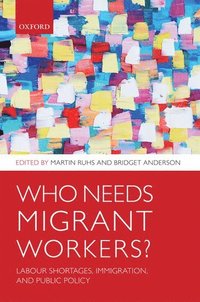
- Format
- Häftad (Paperback)
- Språk
- Engelska
- Antal sidor
- 352
- Utgivningsdatum
- 2012-05-17
- Förlag
- OUP Oxford
- Medarbetare
- Anderson, Bridget
- Illustratör/Fotograf
- 30 Tables 10 Figures
- Illustrationer
- 10 Figures, 30 Tables
- Dimensioner
- 231 x 155 x 25 mm
- Vikt
- Antal komponenter
- 1
- ISBN
- 9780199653614
- 590 g
Who Needs Migrant Workers?
Labour shortages, immigration, and public policy
- Skickas från oss inom 10-15 vardagar.
- Fri frakt över 249 kr för privatkunder i Sverige.
Passar bra ihop
De som köpt den här boken har ofta också köpt Who's Afraid of Gender? av Judith Butler (inbunden).
Köp båda 2 för 1057 krKundrecensioner
Fler böcker av Martin Ruhs
-
Bridging the Gaps
Martin Ruhs
-
The Price of Rights
Martin Ruhs
-
Price of Rights
Martin Ruhs
-
World migration report 2018
International Organization For Migration, Marie Mcauliffe, Martin Ruhs, Martin Ruhs
Recensioner i media
Stuart Basten, European Journal of Population Population scientists and practitioners will find this volume exceptionally helpful.
Alexandre Afonso, Swiss Political Science Review Who Needs Migrant Workers? should be highly recommended to anybody interested not only in immigration but in the governance of modern economies and labour markets in general.
Zinovijus Ciupijus, British Journal of Industrial Relations The books chapters alongside short commentaries, which follow them, provide an authoritative and valuable source for industrial relations scholars interested in migration.
Nigel Harris, Journal of Ethnic and Migration Studies The volume is excellent, and the sectoral studies provide a wealth of data on the unique character of labour demand in each. The editors provide a thoughtful and careful meditation on the complexities.
Stuart Basten, European Journal of Population Highly welcome... probably the most accessible set-piece introduction to migrant work in the UK yet published... Population scientists and practitioners will find this volume exceptionally helpful...the book both explicitly and implicitly provides valuable insights for both sending and receiving countries the world over.
Susan Martin, Director, Institute for the Study of International Migration, Georgetown University A masterful volume on the role of immigration policy in addressing current and future labor shortages. Drawing on a stellar group of experts, the edited volume addresses the employment of foreign workers in a wide range of industries at all skill levels. This comprehensive review of migrant worker programs is a welcome compendium for academics, practitioners and policy makers alike.
David Metcalf, CBE, Emeritus Professor, Centre for Economic Performance, London School of Economics Ruhs and Anderson have put together a terrific team to analyse immigration for work in the UK. An excellent overview by the editors is followed by detailed studies of six sectors: health; social-care; hospitality; food production; construction; and financial services. This is the definitive research on the demand for migrant workers and will inform the debate for years to come.
Klaus F. Zimmermann, Director IZA and Professor of Economics, University of Bonn How labour migration can and should be regulated is one of the most pressing issues of our time. This excellent book is a feasibility study dealing with perceived staff shortages. It provides substantial insights by an outstanding group of scientists and contributes significantly to our understanding of an extremely contentious policy problem.
Rainer Mnz, Erste Bank and Hamburg Institute of International Economics In good times many people profit from the goods and services produced by migrant workers. In times if crisis the same people see them as unfair competitors. This masterly written and edited book fights prejudices with empirical evidence from the UK on labour shortage...
Övrig information
<br>Martin Ruhs' research focuses on the economics and politics of labor immigration, with a strong international comparative dimension. Recent publications include 'Economic Research and Labour Immigration Policy' and 'Semi-compliance and illegality in migrant labour markets.' Martin is a member of the Migration Advisory Committee (MAC), a highly influential body of independent academic economists advising the UK government on labor immigration policy. He was Specialist Adviser to a recent House of Lords Economic Affairs Committee Inquiry into the economic impacts of immigration in the UK. He has provided migration policy analysis and advice for various national governments and international institutions including the International Labour Organisation (ILO), the International Organisation for Migration (IOM), the Global Commission on International Migration (GCIM) and the United Nations Development Programme (UNDP). <p>Bridget Anderson's research interests include low waged labor migration, legal status, and citizenship. Publications include 'Migrants and Work Related Rights' (Ethics and International Affairs 2008), and Doing the Dirty Work? The global politics of Domestic Labour (Zed Books 2000). She has worked with the Trades Union Congress, the Organisation for Security and Co-operation in Europe, the International Labour Organisation, and a wide range of national and international NGOs.<br>
Innehållsförteckning
1. Introduction; 2. Migrant workers: who needs them? A framework for the analysis of shortages, immigration, and public policy; Commentary by Ken Mayhew; 3. The changing shares of migrant labour in different sectors and occupation in the UK economy: An overview; 4. Achieving a self-sufficient workforce? The utilization of migrant labour in healthcare; Commentary by Robert Elliott; 5. Competing with myths: migrant labour in social care; Commentary by Alessio Cangiano; 6. The use of migrant labour in the hospitality sector: current and future implications; Commentary by Linda McDowell; 7. UK food businesses' reliance on low-wage migrant labour: A case of choice or constraint?; Commentary by Ben Rogaly; 8. The dynamics of migrant employment in construction: Can supply of skilled labour ever match demand?; Commentary by Howard Gospel; 9. Immigration and the UK labour market in financial services: A case of conflicting policy challenges?; Commentary by Jonathan Beaverstock; 10. A need for migrant labour? UK-US comparisons
Du kanske gillar
-
Transformed
Marty Cagan
InbundenFrågor & svar


